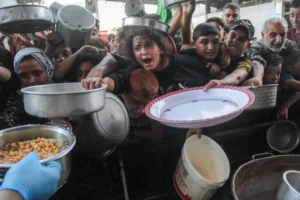How Israel’s starvation of Gaza is affecting Palestinians elsewhere

Palestinians line up to receive food cooked by a charity kitchen in northern Gaza, 11 September 2024
Samah Jabr writes in Al Jazeera on 2 November 2024:
The Israeli war on Gaza has manifested in a variety of brutal forms and the most insidious and devastating one of them has been the weaponisation of starvation. On October 9, 2023, Israeli Defense Minister Yoav Gallant announced that “there will be no electricity, no food, no fuel” allowed into Gaza. The justification was that Israel “is fighting human animals”.
….. ….. …..
Politically and socially produced trauma
To understand the effect of weaponised starvation, it is essential to consider the broader social and psychological framework within which it occurs. Ignacio Martín-Baró, a prominent figure in liberation psychology, posited that trauma is produced socially. This means that trauma is not merely an individual experience but is embedded within and exacerbated by the social conditions and structures surrounding the individual.
In Gaza, traumatogenic structures include the ongoing siege, the genocidal aggression, and the deliberate deprivation of essential resources such as food, water, and medicine. The trauma they result in is compounded by the collective memory of suffering during the Nakba (the mass ethnic cleansing of Palestinians in 1947-8) and the continuous displacement and systemic oppression of the occupation. In this environment, trauma is not just a personal experience but a collective, socially and politically ingrained reality.
Although Palestinians outside Gaza are not directly experiencing the genocidal violence unleashed by Israel there, they have been exposed daily to harrowing images and stories about it. The relentless and systematic starvation of Gaza’s residents has been particularly traumatic to witness.
